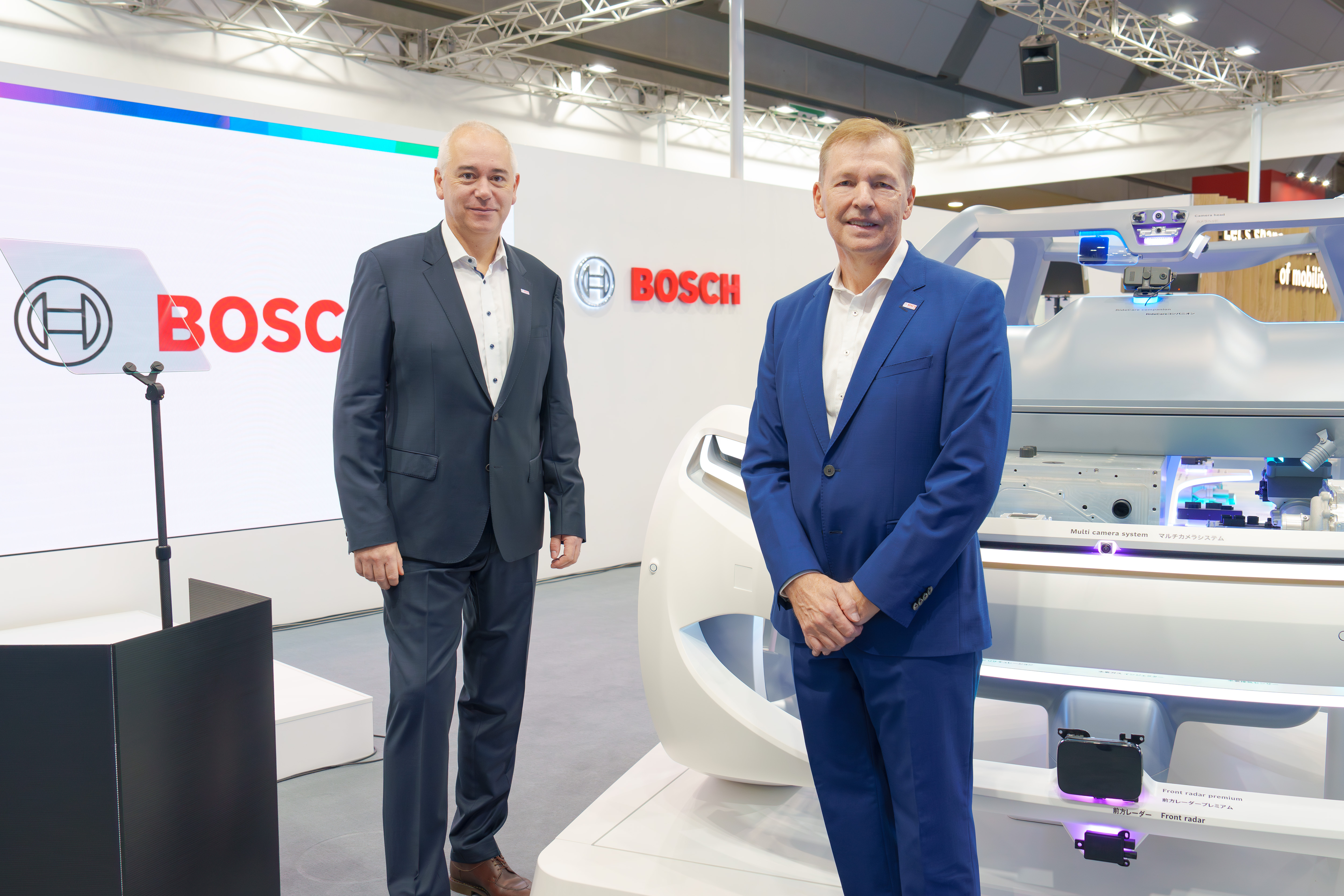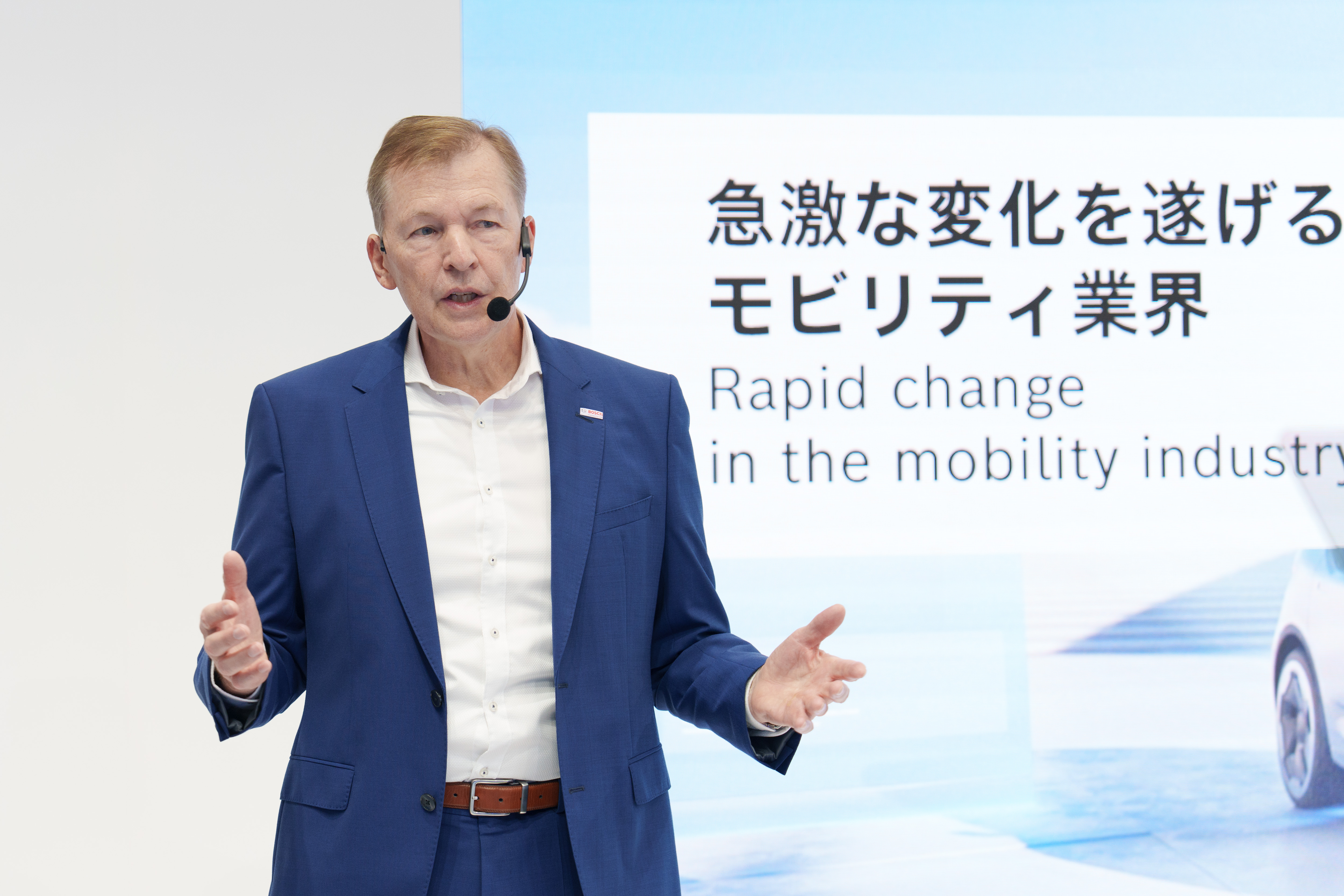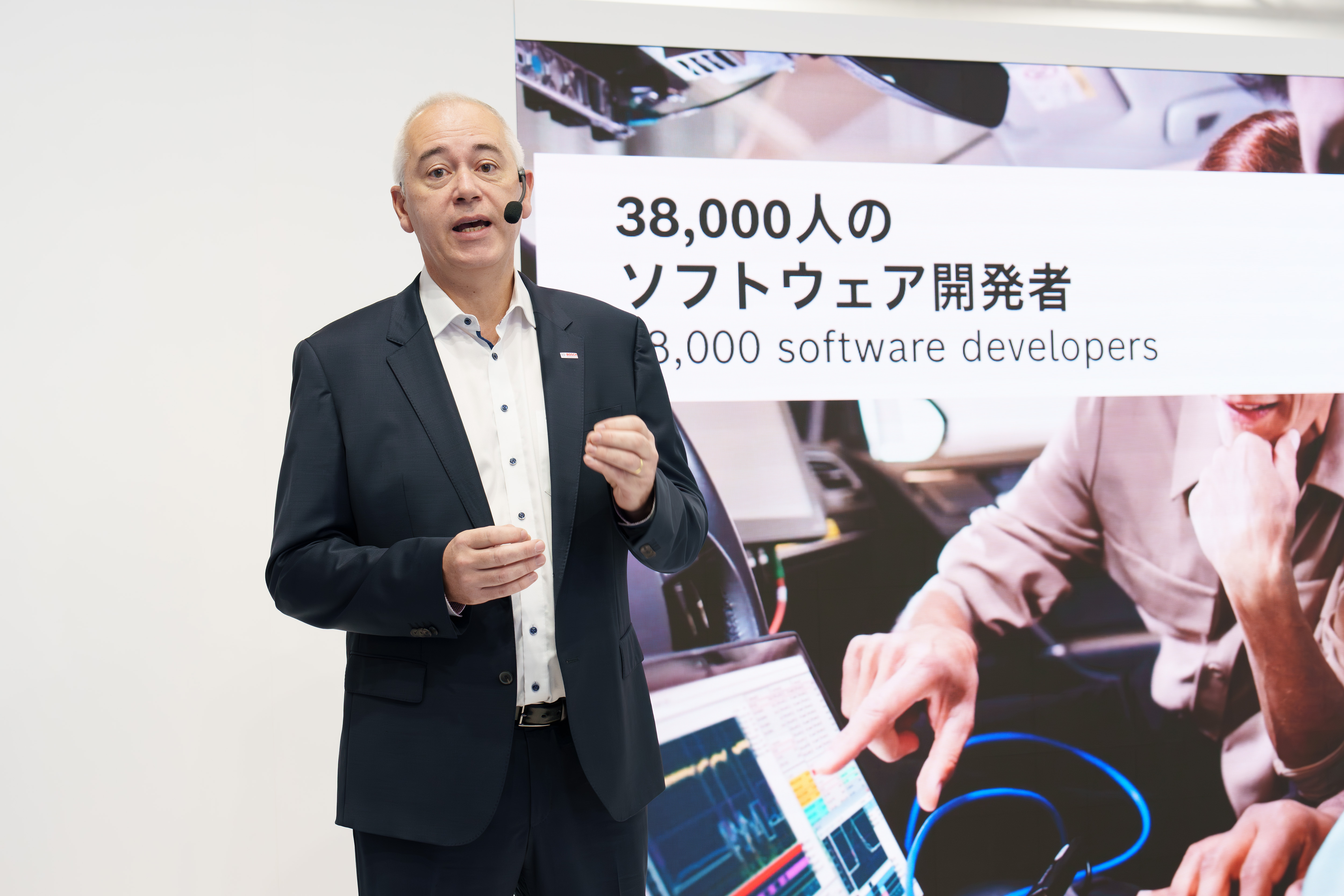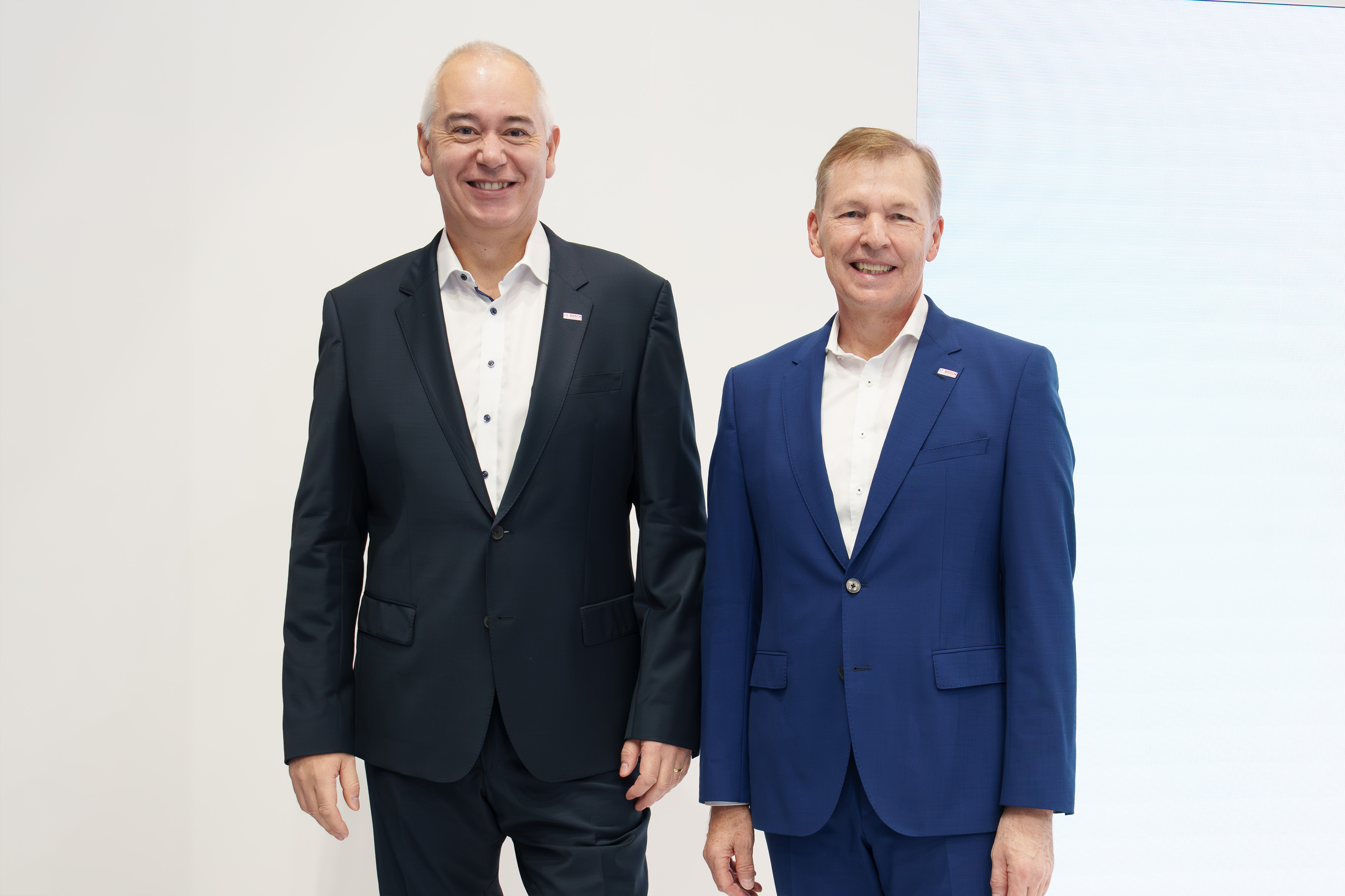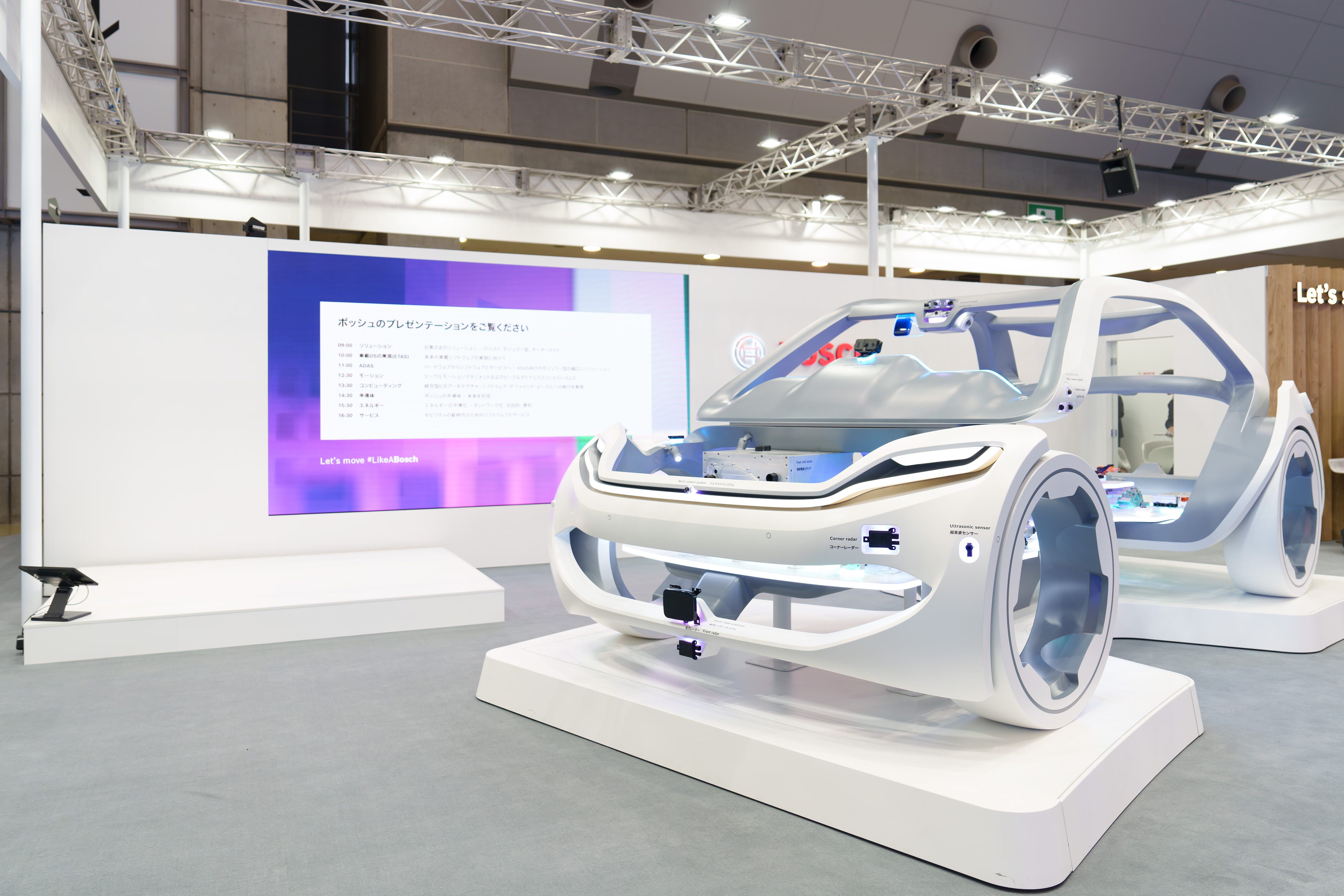Tokyo – Bosch, a leading global supplier of technology and services, is introducing a variety of solutions for realizing a society built on sustainable mobility at JAPAN MOBILITY SHOW 2023. The theme of the Bosch booth is "Let's shape the new era of mobility, together." At a press briefing held on October 26, Klaus Meder, president and representative director, and Christian Mecker, executive vice president and member of the board of directors of Bosch Corporation, Japan explained the strong growth of Bosch in Japan and its software-based initiatives in the country.
Bosch grows stronger than the automotive market in Japan
Consolidated sales by Bosch to third parties in Japan in 2023 are expected to hit a record high, increasing more than 20 percent over the previous year's figure of 340 billion yen (2.46 billion euros). The number of vehicles produced in Japan in 2023 is expected to increase by 10 percent compared to the previous year. Sales at Bosch, meanwhile, are expected to recover at a faster pace than the Japanese automotive market.
"Bosch has expanded its business in Japan in order to fulfil its responsibility to locally support Japanese automakers, which account for 30 percent of global vehicle production," said Meder at the press briefing. As the mobility market changes and is heading towards software defined vehicles, "Bosch will shape the new era of mobility by continuing to grow as a software company in addition to a longstanding core competence in hardware," Meder added.
Bosch software helps to realize a society built on sustainable mobility
To realize a society built on sustainable mobility, Bosch provides a broad range of software-based products and services in addition to its strengths in hardware. As a specific example of sustainable mobility, Bosch covers a wide range of electromobility products, from silicon carbide (SiC) chips to components, active parts, and complete drive systems. As a result, its e-mobility business continues to grow globally, and Bosch is aiming to generate sales of 6 billion euros in 2026.
At the press briefing, Christian Mecker stated that "Bosch is already more than just a systems supplier. In addition to our strengths in hardware, Bosch is responding to the trend toward software-based automotive engineering to realize software-defined vehicles."
As an example of software-related initiatives, Bosch developed Vehicle Dynamics Control 2.0, the core control system for the next-generation of electronic stability program (ESP®). Vehicle Dynamics Control 2.0 is a software to predict the desired behavior of the vehicle according to the inputs of the driver. For example, if the risk of skidding is predicted, it proactively intervenes and applies control to support the movement of the vehicle. This increases the driver's sense of safety and confidence in the vehicle, not only in everyday handling of the vehicle but especially in critical situations. Bosch has worked with its Japanese customers in recent years to develop next-generation ESP® with Vehicle Dynamics Control 2.0. Bosch's next-generation ESP® has been adopted in the Mazda Roadster Upgraded Model. Based on Vehicle Dynamics Control 2.0, Bosch jointly developed "DSC-TRACK" with Mazda. It is an ESP® control mode to reduce the risk of loss of control by expanding the driver's control range at the limit of tire grip when driving on a circuit, so that control intervenes only when sudden unstable behavior such as spinning is detected.
Bosch also provides software-based services to ensure the comfort and safety of mobility users. RideCare Insight is a fleet management service that provides cloud-based data analysis using a sensor box in the vehicle and AI to detect damage or smoke in the vehicle. This information is shared to fleet operators in real-time, which allow them to swiftly arrange for repairs and cleaning when necessary. Beginning by the end of 2023, Bosch will start proof of concept with one of its Japanese customers using RideCare Insight for their car leasing business in North America. For more than six months, Bosch will collect and analyze data from RideCare Insight for this project.
Bosch's software products and services are already used by customers in Japan. "Bosch is already contributing to the development of the mobility market in Japan as a software company by providing a full range of software solutions to our Japanese customers," said Mecker.
As part of initiatives to shape the new era of mobility, Bosch will also be reorganizing its mobility-related businesses as of January 1, 2024. This will allow Bosch to respond even better and faster to the needs of its Japanese customers by providing customized technologies and solutions from a single source. Bosch is also constructing a new headquarters and R&D facility in Tsuzuki Ward, Yokohama to provide a wide range of solutions for its customers and to further expand business in Japan. The new facility, to be completed in 2024, will promote increased collaboration and cooperation among divisions and associates, and will further strengthen Bosch's development structure in Japan.
By providing a wide range of technologies and solutions for mobility from a single source, Bosch will continue to shape the new era of mobility, together with its Japanese customers.
Contact for press inquiries:
Aiko Furuichi
Mariko Johdoji
phone:+81-3-5485-3393
JAPAN MOBILITY SHOW 2023
Bosch is shaping the new era of mobility with its competencies in hardware and software
2023/10/26





Bosch in Japan is currently represented in the country by Bosch Corporation, Bosch Rexroth Corporation and other affiliates. Bosch Corporation is responsible for the development, manufacturing, sales and services of automotive original equipment, automotive aftermarket products and power tools. Bosch Engineering K.K. provides engineering services, such as development and application for automotive systems. ETAS K.K. develops and provides engineering of development support tools of electrical control units. Bosch Rexroth Corporation develops and manufactures hydraulics, FA module components and other systems which contribute to industrial technologies. Bosch Security Systems Ltd. provides security and communication products and solutions to help secure the safety of lives, buildings and properties, and is also a supplier of professional sound systems. In 2022, Bosch Japan achieved sales to third parties of some 340 billion yen and employed approximately 6,250 associates.
Additional information is available online at
https://www.bosch.co.jp Bosch Japan Website (Japanese)
https://twitter.com/Boschjapan Bosch Japan Twitter (Japanese)
https://www.facebook.com/bosch.co.jp Bosch Japan facebook (Japanese and English)
https://www.youtube.com/boschjp Bosch Japan Youtube (Japanese)
The Bosch Group is a leading global supplier of technology and services. It employs roughly 421,000 associates worldwide (as of December 31, 2022). The company generated sales of 88.2 billion euros in 2022. Its operations are divided into four business sectors: Mobility, Industrial Technology, Consumer Goods, and Energy and Building Technology. As a leading IoT provider, Bosch offers innovative solutions for smart homes, Industry 4.0, and connected mobility. Bosch is pursuing a vision of mobility that is sustainable, safe, and exciting. It uses its expertise in sensor technology, software, and services, as well as its own IoT cloud, to offer its customers connected, cross-domain solutions from a single source. The Bosch Group's strategic objective is to facilitate connected living with products and solutions that either contain artificial intelligence (AI) or have been developed or manufactured with its help. Bosch improves quality of life worldwide with products and services that are innovative and spark enthusiasm. In short, Bosch creates technology that is "Invented for life." The Bosch Group comprises Robert Bosch GmbH and its roughly 470 subsidiary and regional companies in over 60 countries. Including sales and service partners, Bosch's global manufacturing, engineering, and sales network covers nearly every country in the world. With its more than 400 locations worldwide, the Bosch Group has been carbon neutral since the first quarter of 2020. The basis for the company's future growth is its innovative strength. At 136 locations across the globe, Bosch employs some 85,500 associates in research and development, of which nearly 44,000 are software engineers.
Additional information is available online at www.bosch.com, www.iot.bosch.com, www.bosch-press.com, and twitter.com/BoschPresse.
Note: one Euro = 137.9900 JPY (Calculated using the average rate in 2022)
Additional information is available online at
https://www.bosch.co.jp Bosch Japan Website (Japanese)
https://twitter.com/Boschjapan Bosch Japan Twitter (Japanese)
https://www.facebook.com/bosch.co.jp Bosch Japan facebook (Japanese and English)
https://www.youtube.com/boschjp Bosch Japan Youtube (Japanese)
The Bosch Group is a leading global supplier of technology and services. It employs roughly 421,000 associates worldwide (as of December 31, 2022). The company generated sales of 88.2 billion euros in 2022. Its operations are divided into four business sectors: Mobility, Industrial Technology, Consumer Goods, and Energy and Building Technology. As a leading IoT provider, Bosch offers innovative solutions for smart homes, Industry 4.0, and connected mobility. Bosch is pursuing a vision of mobility that is sustainable, safe, and exciting. It uses its expertise in sensor technology, software, and services, as well as its own IoT cloud, to offer its customers connected, cross-domain solutions from a single source. The Bosch Group's strategic objective is to facilitate connected living with products and solutions that either contain artificial intelligence (AI) or have been developed or manufactured with its help. Bosch improves quality of life worldwide with products and services that are innovative and spark enthusiasm. In short, Bosch creates technology that is "Invented for life." The Bosch Group comprises Robert Bosch GmbH and its roughly 470 subsidiary and regional companies in over 60 countries. Including sales and service partners, Bosch's global manufacturing, engineering, and sales network covers nearly every country in the world. With its more than 400 locations worldwide, the Bosch Group has been carbon neutral since the first quarter of 2020. The basis for the company's future growth is its innovative strength. At 136 locations across the globe, Bosch employs some 85,500 associates in research and development, of which nearly 44,000 are software engineers.
Additional information is available online at www.bosch.com, www.iot.bosch.com, www.bosch-press.com, and twitter.com/BoschPresse.
Note: one Euro = 137.9900 JPY (Calculated using the average rate in 2022)
